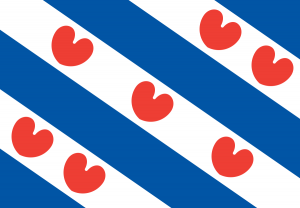Language/Western-frisian/Grammar/Comparative-and-Superlative
| ◀️ Descriptive Adjectives — Previous Lesson | Next Lesson — Family Members ▶️ |
Introduction
In this lesson, we will cover comparative and superlative adjectives in Western Frisian. Adjectives are words used to describe a noun or a pronoun, while adverbs modify verbs, adjectives, and other adverbs. Comparative and superlative adjectives and adverbs are used to compare two or more things or actions. In this lesson, you will learn how to form and use comparative and superlative adjectives in Western Frisian.
After mastering this lesson, these related pages might interest you: Pronouns & Prepositions of Place.
Comparative Adjectives
Comparative adjectives are used to compare two nouns or pronouns. In Western Frisian, comparative adjectives are formed by adding the suffix "-er" to the end of the adjective. However, if the adjective ends in "-d", "-t", "-s", "-z", "-sch", or "-r", then the suffix "-er" is not added, and the adjective is simply followed by the word "as" to indicate a comparison.
Here are some examples of comparative adjectives in Western Frisian:
| Western Frisian | English |
|---|---|
| jonger | younger |
| slimmer | smarter |
| groter | bigger |
| goedkoper | cheaper |
| duurder as | more expensive than |
| mooi as | prettier than |
In Western Frisian, you can also use the word "meer" before an adjective to express "more" or "most" before a superlative. For example:
- Dit boek is meer interessant dan dat boek. (This book is more interesting than that book.)
- Deze taart is de lekkerste. (This cake is the most delicious.)
Superlative Adjectives
Superlative adjectives are used to compare three or more nouns or pronouns. In Western Frisian, superlative adjectives are formed by adding the suffix "-st" to the end of the adjective. However, if the adjective ends in "-d", "-t", "-s", "-z", "-sch", or "-r", then the suffix "-st" is not added, and the adjective is simply followed by the word "ste" to indicate a superlative comparison.
Here are some examples of superlative adjectives in Western Frisian:
| Western Frisian | English |
|---|---|
| jongst | youngest |
| slimst | smartest |
| grootst | biggest |
| goedkoopst | cheapest |
| duurst | most expensive |
| mooiste | prettiest |
Irregular Adjectives
Some adjectives in Western Frisian have irregular comparative and superlative forms. Here are some examples:
| Western Frisian | Comparative | Superlative |
|---|---|---|
| goed | beter | best |
| slecht | slechter | slechtst |
| veel | meer | meest |
| weinig | minder | minst |
Adverbs
Adverbs are used to modify verbs, adjectives, and other adverbs. In Western Frisian, adverbs are generally formed by adding the suffix "-er" to the end of an adjective. For example:
- lang (long) becomes langer (longer)
- mooi (pretty) becomes mooier (prettier)
- snel (fast) becomes sneller (faster)
To form the superlative of an adverb, you add the suffix "-st" to the end of the adverb. For example:
- lang becomes langst (longest)
- mooi becomes mooist (prettiest)
- snel becomes snelst (fastest)
There are, however, some irregular adverbs with irregular comparative and superlative forms. For example:
| Western Frisian | Comparative | Superlative |
|---|---|---|
| goed | beter | best |
| slecht | slechter | slechtst |
| graag | liever | liefst |
Conclusion
Congratulations, you have learned how to form and use comparative and superlative adjectives and adverbs in Western Frisian. Keep practicing, and you will soon be able to compare things and actions like a native speaker!
Having concluded this lesson, consider checking out these related pages: Descriptive Adjectives & Give your Opinion.
Other Lessons
- Interjections
- How to Use Have
- Plurals
- Give your Opinion
- Adjectives
- Basic Sentence Structure
- Coordinating Conjunctions
- Personal Pronouns
- Prepositions of Place
- Gender
Sources
Template:Western-frisian-Page-Bottom
| ◀️ Descriptive Adjectives — Previous Lesson | Next Lesson — Family Members ▶️ |

